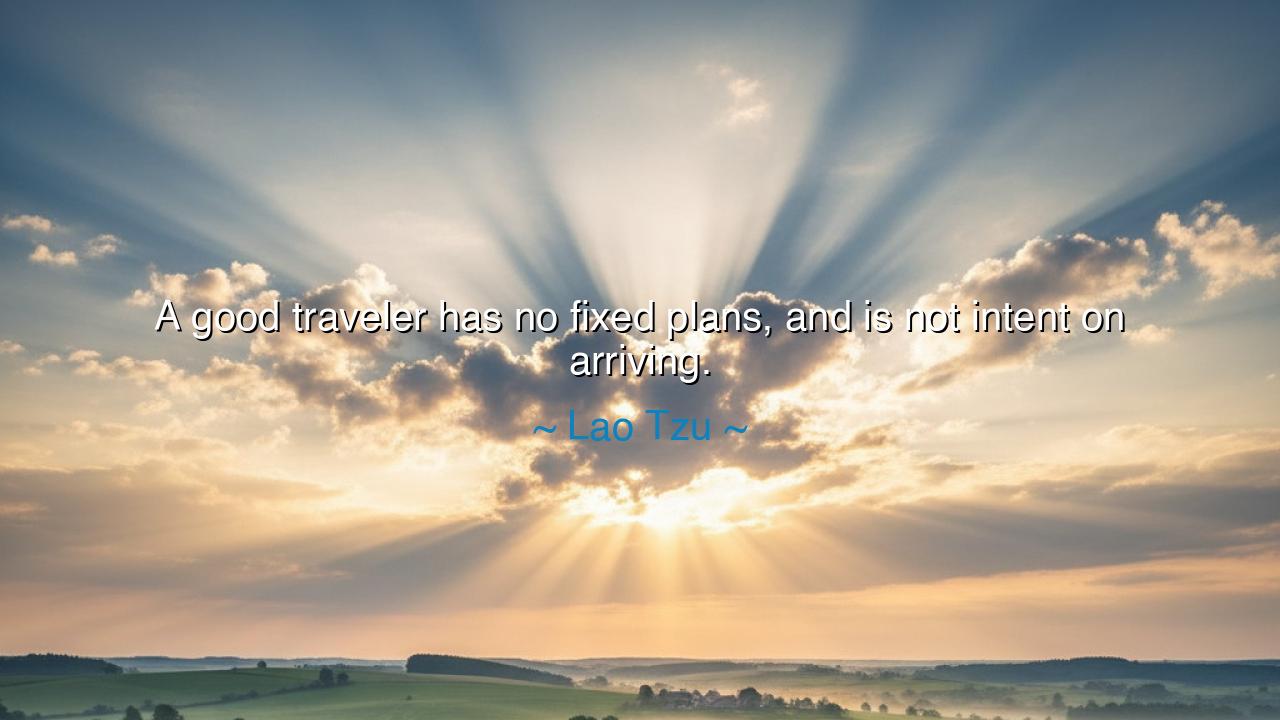
A good traveler has no fixed plans, and is not intent on






The ancient sage Lao Tzu, father of the Tao and master of paradox, once declared: “A good traveler has no fixed plans, and is not intent on arriving.” These words, like many of his, flow as a river—simple in sound, yet unfathomable in depth. They teach that the journey of life is not about rigid design nor hurried destination, but about the openness of spirit, the ability to move with the current, and the wisdom to find fulfillment in the path itself.
When he speaks of the “good traveler,” Lao Tzu does not mean one skilled in maps or measured in speed. He means one who embodies harmony with the Way. To travel well is to walk without clinging, to step without anxiety, to allow the road to unfold without forcing its direction. The “fixed plans” of the mind bind the soul, for they create disappointment when the path bends differently than expected. The good traveler is free, because he accepts whatever comes as part of the journey.
The second part, “not intent on arriving,” carries even greater wisdom. The traveler who obsesses over the end misses the beauty of the middle. To desire only the arrival is to turn the journey into an obstacle, to waste the very hours that make life what it is. Lao Tzu reminds us that there is no true “arrival” in life, for every destination is but another beginning. To live wisely is to savor each step, each meeting, each breath, as part of the great unfolding.
History offers us luminous examples of this truth. Consider Marco Polo, who traveled from Venice to the courts of Kublai Khan. Had he fixed his heart only on arrival, he would have missed the wonders of deserts, the marvel of mountains, and the lessons of countless cultures along the way. His greatness lay not merely in reaching the East, but in seeing, tasting, and recording the richness of the road. So too with Alexander the Great, whose campaigns spanned continents. Though his conquests were marked by ambition, he too discovered that each new city, each new people, was more than a waypoint—they were worlds unto themselves.
The origin of Lao Tzu’s teaching rests in the Taoist vision of harmony with the universe. The Tao is like water—it flows where it will, yielding yet unstoppable. To insist upon rigid plans and destinations is to resist the flow of the Tao, to suffer against its current. The good traveler, however, moves as water does, bending, adapting, and finding its course without force. Thus, his journey is not hindered by obstacles, for he sees obstacles themselves as part of the path.
The lesson for us is clear: live as the good traveler. Do not fix your plans so tightly that life cannot surprise you, nor place your joy only in the future, so that the present becomes a burden. Instead, open yourself to change, to detours, to unexpected companions and unimagined vistas. The journey itself is the treasure. To rush toward the end is to lose the richness of the unfolding.
Practical action flows from this wisdom. When you travel, literally or metaphorically, allow for flexibility. If the train is delayed, see what beauty lies in waiting. If your life shifts course, seek what new wisdom it brings. Release the obsession with “arriving”—whether at wealth, at fame, at security, or even at enlightenment—and instead embrace the steps themselves as sacred. Let every moment be your home, and you will never be homeless upon the earth.
Thus, the teaching of Lao Tzu endures: “A good traveler has no fixed plans, and is not intent on arriving.” To future generations, let this be remembered not only as guidance for the road, but as guidance for the soul. Life itself is the journey, and the wisest walk it not with anxious haste, but with open hearts, ready to receive the gifts of every step.






AAdministratorAdministrator
Welcome, honored guests. Please leave a comment, we will respond soon